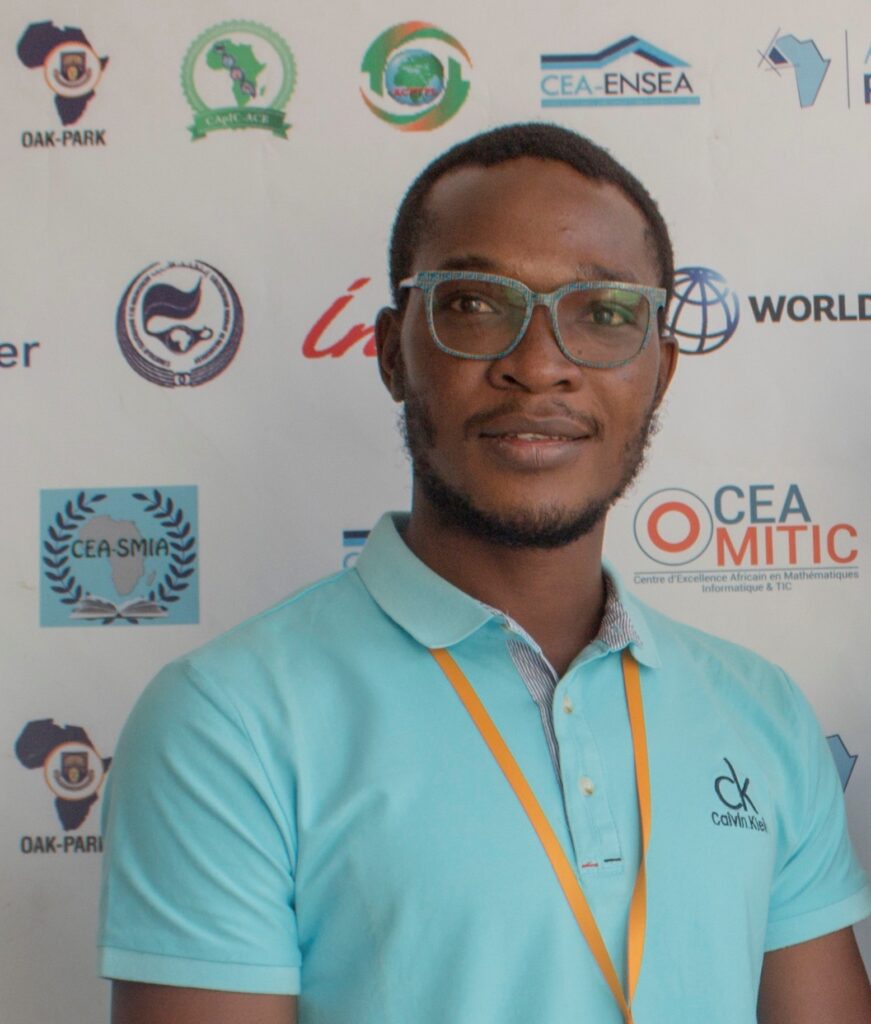STUDENT VOICES – Essohanam Djeki’s quest to redesign the use of ICT in Education across Africa
Essohanam DJEKI is a Togo national and a Ph.D. student at the African Center of Excellence in Mathematical Science, Informatics, and Applications (CEA-SMIA), hosted by the Institute of Mathematics and Physical Sciences – University of Abomey-Calavi, Benin. He received his master’s degree in Information and Communication Technology from the CEA-SMIA in 2020. His PhD thesis is being jointly supervised with in collaboration with the African Center of Excellence on Technology Enhanced Learning (ACETEL) of the National Open University of Nigeria (NOUN). Curious, determined, organized, rigorous, persevering, and creative, Essohanam is passionate about Cybersecurity, Privacy, and Artificial Intelligence.

Why did he choose to pursue his entire academic career at CEA-SMIA?
Essohanam answers: “I chose CEA-SMIA because of the faculty’s expertise and the high-quality training that the center offers in computer science in the sub-region. For over three decades, the center has maintained its reputation as a Center of Excellence. As such, there is no need to travel to the Western or developed countries to have access to World-class, highly competitive graduate training.”
Essohanam is now in the 2nd year of his Ph.D. studies addressing African distance learning spaces’ security within the COVID-19 context. His research aims to propose solutions to protect the privacy and personal data of participants (students and teachers) during online courses. He decided to focus on Digital Education because he finds it crucial and beneficial to enhance ICT use in higher education and education in general.
His motivation for Digital Education: “I remember using ICT to prepare essays and dealing with some examinations in my final year of high school. It helped me a lot! If I had discovered earlier that ICT was not only about social networks and could also be used for learning, I would probably be in a better position than I am today. I don’t want others to be late in discovering the benefits that IT could bring to education.” For his professional career aims to “carry out projects with socio-economic impacts and contribute to the adoption, integration and use of ICTs in African education.”
During his 1st year of studies, Essohanam successfully published five papers, three of which were published in IEEE journal and conferences, and two in Springer journals. His first-year work covers Digital Education Security in general. One of his studies related to the quantitative analysis of Digital Education revealed that the research on E-learning Security and the contribution of African scholars and countries are incredibly scant. He also highlighted the security issues facing Digital Education, proposed protection solutions, and the best practices for online courses. Such productivity has resulted from his great motivation, the support of his supervisors and the Digital Science and Technology Network (DSTN). He claimed: “The inspirational advice and guidance of Prof. Jules DEGILA, Prof. Muhtar Hanif ALHASSAN and Dr. Carlyna BONDIOUMBOUY provided me with the necessary keenness, courage and motivation to persevere in my efforts even during the most difficult times.. DSTN organized training on research methodology and tools that pushed me into gear. My determination and perseverance also helped me to hold up my head over time and produce good quality research to show that it is possible to succeed as an African student living in Africa. I set myself an objective to give my best during this thesis and to be worldwide recognized in my field through my contributions.”
And then, what are you planning for 2022?
“This year, I plan to carry out studies that will be much more specific to African contexts and realities. This year’s main purpose is to understand African learners’ behavior during online courses, consider African students’ perception and desires, explore how ICT is used in education, and design African online learning spaces. I believe that it is by knowing users well enough that we will be able to propose a secure and suitable solution.”
As one of the first DSTN funded Ph.D. students, Essohanam said he is proud to be part of an interdisciplinary scientific network promoting collaborative research. Essohanam’s advice to young people, and especially to young Africans who are aspiring to or already pursuing their PhDs, is: “give the best during the Ph.D. so that you don’t have to regret what you could have done if you had given it all. Always be available to learn with humility. Accept constructive criticism to improve your research and skills. Being a Ph.D. student does not mean knowing everything. We never end learning. It is still the right time to learn and share! Always strive for excellence, do not compare yourself to others, compete only with yourself. Finally, be a partisan of a well-done job.”
